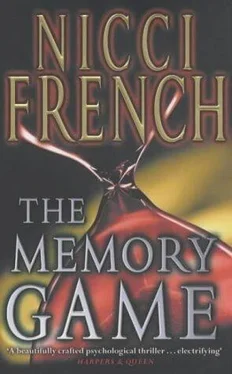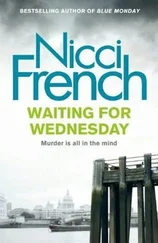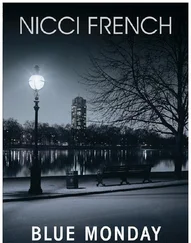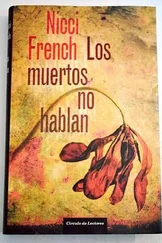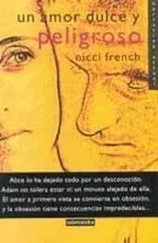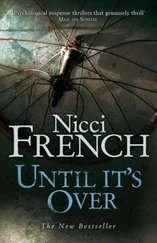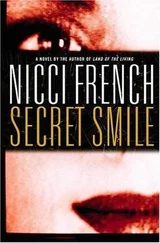Nicci French - The Memory Game
Здесь есть возможность читать онлайн «Nicci French - The Memory Game» весь текст электронной книги совершенно бесплатно (целиком полную версию без сокращений). В некоторых случаях можно слушать аудио, скачать через торрент в формате fb2 и присутствует краткое содержание. Жанр: Триллер, на английском языке. Описание произведения, (предисловие) а так же отзывы посетителей доступны на портале библиотеки ЛибКат.
- Название:The Memory Game
- Автор:
- Жанр:
- Год:неизвестен
- ISBN:нет данных
- Рейтинг книги:4 / 5. Голосов: 1
-
Избранное:Добавить в избранное
- Отзывы:
-
Ваша оценка:
- 80
- 1
- 2
- 3
- 4
- 5
The Memory Game: краткое содержание, описание и аннотация
Предлагаем к чтению аннотацию, описание, краткое содержание или предисловие (зависит от того, что написал сам автор книги «The Memory Game»). Если вы не нашли необходимую информацию о книге — напишите в комментариях, мы постараемся отыскать её.
The Memory Game — читать онлайн бесплатно полную книгу (весь текст) целиком
Ниже представлен текст книги, разбитый по страницам. Система сохранения места последней прочитанной страницы, позволяет с удобством читать онлайн бесплатно книгу «The Memory Game», без необходимости каждый раз заново искать на чём Вы остановились. Поставьте закладку, и сможете в любой момент перейти на страницу, на которой закончили чтение.
Интервал:
Закладка:
‘All right, I’ll make the cuts and I’ll also make sure that if I have a schizophrenic collapse while doing it, I’m safely out of the borough. So, when shall we four, or duly appointed representatives of we four, meet again?’
‘I’ll call your secretary, Jane,’ said Mr Brady. ‘Thank you for being so relatively reasonable.’
I got back on my bike and cycled as fast as I could until I felt the muscles in my thighs burning, mentally shedding little details and finesses of my hostel plan as I went.
My next unwelcome task on this day of unwelcome tasks was to visit my father, who wanted to show me some plans. I wasn’t going to see him alone. I’d mentioned the invitation to Paul on the phone and he’d insisted on coming along, ostensibly to see how our father was, but I suspected that it had something to do with his film. At least I’d get a lift. I dropped the bike back at the house and waited for Paul to arrive, which gave me the excuse to smoke two cigarettes. Then we drove down to Stockwell with Paul constantly complaining that this was the very worst time to drive south and that we would have been quicker on the Northern Line and I replied that nothing at all is quicker on the Northern Line which resulted in a silence all the way to Blackfriars Bridge.
My father was born in 1925. He’s sixty-nine. He’s an old man. I know that intellectually, but don’t usually feel it. After all, he was hardly older than I am now when Sergeant Pepper came out and that doesn’t seem all that long ago to me. I was fifteen. I was almost not a virgin. He’s always seemed the same age. But when Dad opened the door to Paul and me, I really did feel that a gap was opening up between us, that he looked frailer, greyer, stiffer around the shoulders, the liver spots on his hands were more shockingly prominent. But as I hugged him and looked more closely at him I saw that he was still handsome. He had more hair than his son, and it covered more of his head as well, and I brushed my hand through it, neatening it with what I hoped seemed like affection.
‘Tea for you both?’ he asked.
‘You go and sit down and I’ll make it,’ I replied. ‘I’ve brought a jar of lemon curd so if you’ve got any bread, we can have some of that on toast.’
Dad and Paul went into the living room, a cluttered space full of books and papers between four dark red walls. The kitchen, though, was more like a Quaker’s meeting house, with rough plaster, whitewashed walls and uncomfortable wooden benches. A discordant note was introduced by the low-voltage spotlights in the ceiling, which in my experience are principally used for commercial premises and are entirely unsuitable for a kitchen, especially one which is as poorly wired as Dad’s. Ever since I can remember, long before Mum died, Dad has been going to look at the wiring but the implications of what he might find have always been too alarming. Instead, he’s forever adding to it. Everywhere you look, there is a spaghetti of flex tacked along the wall.
When I carried the tray of tea and toast into the living room, Dad was sitting in his armchair and Paul, perched on a footstool, was leaning conspiratorially towards him. The gloom in which they were plunged was a further product of Dad’s lighting strategy dating from the mid-seventies, based on the concept that you don’t light rooms, you light ‘spaces’. The result was that the flexes were removed from the ceiling rose in every room in the house and horrible chrome lights were fixed in corners. The house was now made up of spaces of light and spaces of darkness and Dad and Paul were now sitting in one of the spaces of darkness. When I got close enough to see, I recognised the determined gleam in Paul’s eyes: he was researching. There was even a notebook poking out of his jacket pocket.
‘Has Paul mentioned he’s going to do a documentary on the family, Dad?’ I asked cheerfully, slamming the tray down.
Paul sat up and scowled. ‘I was going to, Jane,’ he said. ‘Give me a chance.’
A trail of yellow worked its way down Dad’s chin. ‘Why?’ he asked. ‘What’s so interesting about us?’
Paul took a deep breath and laid down his piece of toast. ‘That’s a very good question,’ he said, and Dad looked faintly surprised. ‘When I talk about my family – which, of course, is interesting to me – then I am also, for the viewer, in some ways allowing them a new way to think about their own family, their own childhood. Every family is different, and yet every family is similar.’
‘Is that a quotation?’ I muttered. Paul ignored me.
‘When I talk about our family – you and Mum and Jane and me – and when I talk about the Martellos, because, of course, I can’t leave them out, what are the things that I’ll be addressing?’ He wasn’t waiting for a reply so I picked up his piece of toast and bit into it hungrily. I’d missed lunch. ‘Nostalgia. Closeness and estrangement. Possessiveness and jealousy. The idyll of childhood. The pain of growing up. The hopes that parents have for children. The resentments that children feel about their parents. All these things and more can be explored through one family. I hope that you’ll want to help me?’
‘Enough of this nonsense,’ Dad said. ‘Drink your tea, Paul, I want to show Jane something. Come over here.’
He led me over to the desk in the corner. Drawings and large old books were piled high.
‘How’s your project going?’ he asked.
‘Which one?’
‘I don’t mean at the Stead. The hostel.’
‘It’s becoming a torment.’
‘I’m sorry, Jane. Anything I can do to help?’
‘Yes, kill everybody in the housing department.’
‘It’s half the job,’ Dad said abstractedly. ‘I asked you here with an ulterior motive. I thought you might cast an eye over this.’
‘What is it?’
‘This is going to be the project of my old age. I’m going to restore the interior of this house.’
‘What to?’
‘To the basic structural and decorative order of the interior as it was originally conceived in the mid-1880s. You can see I’ve done some preliminary drawings. The basic fabric is original anyway. The main work will be restoring the partition in this room and on the first floor.’
Paul was standing behind us now, looking over my shoulder. ‘You mean you’ll be blocking up the bits you knocked through in the sixties,’ he said.
I gave Paul a kick but my father continued as if he hadn’t heard.
‘The cornices and some roses will need to be restored, of course, but fortunately we can take mouldings from those which survive.’
‘I’m staggered,’ I said. ‘But isn’t it going to be rather expensive?’
‘I’m going to do it myself.’
‘You’re not.’
‘I am. Pat Wheeler has said he’ll help out.’
I didn’t know what to say, but I didn’t need to say anything because my father was talking animatedly. He shuffled through his preliminary drawings and specifications. He talked of sash pulleys, sealers and firebacks, plaster dabs, angle beads and door furniture. Le Corbusier had been born again as William Morris. Paul teasingly asked if he was going to have gas illumination and the central heating removed. My own feelings were mixed, not only because of the impracticality of the plan but because it seemed like a scheme in which my father was systematically removing himself from his own house. At the end of the reconstruction, if he ever reached the end, the interior would have been stripped of every innovation and ideal that my father had lived by. I mumbled something about respect for the past and my father gave a heavily sarcastic laugh.
‘We all have different ways with our past. I hope I’m going to restore it and preserve it. Is that better than making a television documentary about it?’ He gave a sharp look at Paul, whose face was reddening.
Читать дальшеИнтервал:
Закладка:
Похожие книги на «The Memory Game»
Представляем Вашему вниманию похожие книги на «The Memory Game» списком для выбора. Мы отобрали схожую по названию и смыслу литературу в надежде предоставить читателям больше вариантов отыскать новые, интересные, ещё непрочитанные произведения.
Обсуждение, отзывы о книге «The Memory Game» и просто собственные мнения читателей. Оставьте ваши комментарии, напишите, что Вы думаете о произведении, его смысле или главных героях. Укажите что конкретно понравилось, а что нет, и почему Вы так считаете.
